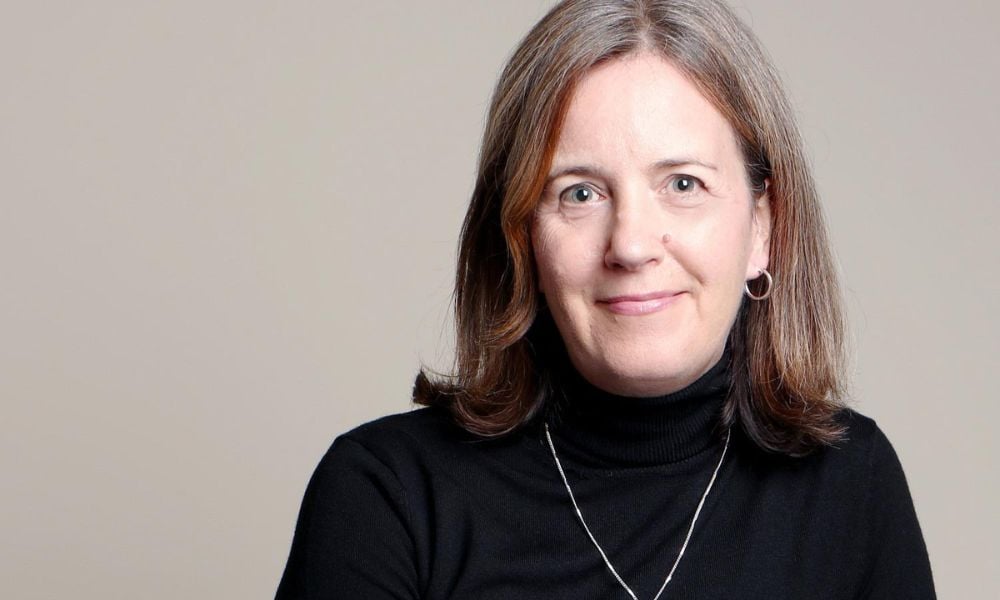Lexpert Rising Star award winner David Stern, partner at Blaney McMurtry LLP, talks tenacity, vision, and what it takes to rise to the top in the world of sports & entertainment law
Recent Articles
To view full transcript, please click here
Brodie Lawson [00:00:07] Hello, everybody, and welcome to Lexpert. TV. I'm Brodie Lawson and today I am speaking with Dave Stern, Partner at Blaney McMurtry LLP, and winner of this year's Lexpert Rising Star Award. Welcome, Dave. And thank you so much for being with us today.
Brodie Lawson [00:00:24]Thank you so much for having me. I really appreciate it.
Dave Stern [00:00:26] Oh, of course, and congratulations on your win. That's huge. I hear you had a pretty fearless approach to launching your career. You were cold calling. And you entered the profession in a bit of a different way. As a salesperson who was really willing to take on surplus work from the legal department. Would you say that gumption that tenacity, your real inability to take no for an answer and your ability to think outside the box has stayed with you? And how has it helped you get your career to where it is today?
Dave Stern [00:01:01] I mean, it's part of my personality. So it's always stayed with me to some degree. I've always been a big believer in the notion of there's more than one way to succeed, there's always one, one pass more than one path to move forward. I felt like when I was in law school, and as a young lawyer, you're often you're alerted about your thought about one path to move forward. And you listen to speakers in terms of talking about their career path. And this is the way to do it. This is the best way. And I've always felt like there's more than one way to succeed, and to get a job that you want and to advance your career. So I think that that's always been, that's always been a big part of who I am as, as a person. I'd like to think I'm incredibly resourceful, and passionate. And I know what I want, I've always found a way to set myself apart, it's been really important, especially during law school, when I've always felt a little bit different. In terms of sports and entertainment law and building this career out, I knew that this is something that I wanted, and I didn't want to wait a decade to get it. So I ended up I mean, as you as you as you referenced, I ended up Cold Calling 1[00 raiders. And I got hired as a legal intern for the team, which was an unbelievable experience, and then cold called MLSC and took a sales job just to get in the building and eventually worked my way into the role of legal counsel. I cold called a boutique entertainment firm that led to a six year stint, which allowed me to get an incredible amount of experience in entertainment law. Blaney's, at the time, wasn't looking for a new lawyer certainly incorporated or entertainment, but we connected nonetheless. And it's been a perfect fit for me in my practice. And I think just from a personality standpoint, I think it's helped not just get me these positions, and try to find success in them. But it's also helped me advocate for my clients not taking no for an answer stays with me every day, I think, you know, if I'm working with a client and film or television, every project that we work on has their own set of they have their own set of hurdles to jump over and plenty of opportunities to be discouraged and kind of jump ship. I find this to be a personality trait of mine, as I as I referenced, and especially my clients that are come that are coming from BIPOC or marginalized communities. There's a lot of situations where they often get discouraged, and they're told no. And their hurdles sometimes seem larger. And it almost like lights that fire within me or keeps that fire burning to just help advocate for them and find a way around for them and not take no for an answer not just for me, but for them. So I think it's helped tremendously for my career and for the success of my clients.
Brodie Lawson [00:03:47] Absolutely, yes, it's certainly served you well thinking outside the box. And that tenacity that really is amazing. I mean, you've touched on this a little bit, but I'm sure there's always more to say. So what would you say really sets you apart and makes you a rising star? And what would you say are the other qualities necessary for success in your area of practice?
Dave Stern [00:04:11] As I mentioned, being resourceful and being passionate have been two key personality traits and things that I never really lose sight of. I would think the most important thing to success at least in my line of work and something that's always been near and dear to my heart is connecting with my clients like I really care about them and their needs. It brings me tremendous joy to help them achieve their dreams and accomplish their goals as cliche as it sounds. You know, when I started off as an as a sports lawyer working for sports teams, I felt like a little bit of that passion was at a standstill because I love the team and the organization but I always felt like anyone can do this work. The work itself wasn't as exciting for me and then working with entertainment clients, individual athletes individual Film and television producers, independent production companies understanding that they have this goal, they have this vision for themselves, certainly, in the world of film and television, they have a passion project, which I don't have. But I see that in them. And to be able to help them get there, I think has been really important. So not just obviously advocating and being resourceful, being passionate, but really connecting with them. I'm not motivated financially, to me, I will take as much time off work as possible to be with clients, hang out with them be on set beyond shoots, red carpet events, other parties or, you know, other situations, rap parties, things where you know, whether it's a big event, or it's really intimate, just spending time and really connecting with clients has been something that's always stuck with me. They mean the world to me, and I always like to think that they feel the same way about me.
Brodie Lawson [00:05:58] And what about some of the biggest challenges in sports and entertainment law? How do you tackle them? And maybe if you could let me know, some of that advice that you might give to other lawyers in the same area, or younger lawyers, or maybe law students who might be eyeing that area of practice as well?
Dave Stern [00:06:16] Sure, entertainment lawyer is actually fairly complex, because it involves a deep knowledge of were multiple areas of the law. So I think that's probably the biggest challenge is keeping up with knowledge and corporate commercial law, Labor and Employment Law, intellectual property law, but the most important thing, by far is industry knowledge. I mean, you could be the greatest corporate commercial lawyer on Earth. And if you if you have, you know, a licensing deal or an option deal or writer agreement, and you don't know what you're looking for, you don't really know what you're negotiating, you're lost. So I think the industry knowledge is an important part of the job. It's certainly it's a challenge, and also kind of bleeds into my advice that I would have towards, you know, junior lawyers, either in sports and or entertainment law, or trying to get into the industry. It's understanding how important this type of knowledge is understanding the industry reading up on the news in Canada, and frankly, like North America, even worldwide, but understanding what the industry is that you want to work in. And I remember my conversation with, at the time, General Counsel, Robin Brudner, MLSC. And I kept, I was adamant about wanting to work in sports lunch, it's like you keep saying sports law, sports law. No offense, but you probably don't even know what sports is. So I think understanding the industry is, is of critical importance. In terms of just additional advice that I would have for junior lawyers. As we kind of talked about earlier, I would, my advice would be not to be discouraged by other people's paths, or recommendations. I felt like that was a discouraging component for me, throughout law school and starting off, because you hear about the one way to do this, if you want to be in entertainment, you get corporate law training, or IP training, or labor, employment training for years and years, and then try to break it later. And that works. For a lot of people. I understand why people give that advice. But there's so many different ways to get into the industry. So learn from people, but don't try to spend your time mimicking their careers or being discouraged by their path or your inability to follow that path. Learn. Ask the right questions, meet people stay connected and understand the industry as much as you can. I mean that if you can, if you can break in from an industry knowledge standpoint, it's really important. And I also think, again, it comes back to personality. I don't know any entertainment law that doesn't like dealing with people or doesn't care doesn't have passion. So show that passion. Go to certain events, meet people network, even if it doesn't mean that they're going to be your client. I mean, you can always think of everything on docketing and dollars and cents, spend the time learn the industry and meet people in the industry. And if you do all these things, I'm pretty sure good things are gonna happen for you.
Brodie Lawson [00:09:21] Yeah, that's great advice. That's excellent. So I'm wondering why Blaney McMurtry What do you like about the firm and how you got your start there? Sure.
Dave Stern [00:09:32] So for those who don't know I mean, the entertainment law landscape in Ontario is pretty small and it's nearly two dimensional. I mean, there's 8 to 10 Boutique entertainment firm that consists of 2 to 8, 9 lawyers. And then there's a large Bay Street firms to Goodmans the Dentons that that do entertainment work, and I've great relationships with both sides and I know specific lawyer was from most of these firms and they're fantastic. I've always felt like more of a boutique lawyer only because of the clients that I represent. I mean, again, that's why I fell in love with the entertainment component is I'm meeting people, if it's if I'm representing a company or production company, it's typically headed by one to two people, maybe three. So really working with the creatives directly understanding who they are, as people connecting with them, that's been a big part of my practice. And my hourly rates need to be low enough to do and I came from a boutique law firm. And it's been it was an amazing experience. Blaney's was a very unique situation. For me personally, because it's kind of the best of both worlds. It's obviously, I mean, we're much larger than a boutique firm, where we're based, very firm. But it's large enough that I have more resources than I've ever thought possible or ever hoped to get. I mean, assistants, law clerks, juniors, amazing lawyers, across a multitude of different legal disciplines that I can refer work to and trust that they do a great job. And it's also regional. So there's not multiple offices, the chances of conflicts are low. There's also a situation where I can have full control over my hourly rate, and as a result, keep my clients and expand my client base. So I think it's been the perfect firm, it's extremely entrepreneurial. And they trust me to go out and create this department and build this department. And I think just kind of the cherry on top is ladies has always had a great history of sports and entertainment law. spanning decades, so it's really like an honor to be able to be here and head up this department and do whatever I can't to bring this back. Bring him bring back a sports entertainment practice here, run and try to make it as big as possible.
Brodie Lawson [00:11:57] That's amazing. It sounds like a really perfect fit.
Dave Stern [00:11:59] Thank you. It's been fantastic. I've been here for three and a half years. And it has been just an amazing experience for me. I'm so grateful that Blaney's gave me a shot. And they've been great to me.
Brodie Lawson [00:12:10] It sounds like their investment and their trust in you is really paying off. So that's wonderful. All right. My last question for you is really about your goals going forward? You we've talked a little bit about developing your client base. I'm curious about that. And really what your thoughts are when you're looking to the future?
Dave Stern [00:12:28] It's a good question. I don't spend as much time thinking about a specific plan, I kind of take a couple years at a time. As I mentioned, I've been here three and a half years, and it's been I've achieved more success with Blaney's than, you know, I could have hoped and I'm very grateful for that, I think my goal would be to continue to build it as much as I can. And to kind of have that place among, you know, the elites in terms of sports entertainment, both nationally and internationally. My reputation is everything to me. So the more people I connect with both clients and, and other councils and just reputation really from a regional or the national international standpoint to build up Blaney's and myself would be would be fantastic. But I also think the biggest component to me that I've always been really excited about in this area. Not specifically sports entertainment, but just being a lawyer and having the privilege to practice is really to connect not just with clients, but with up and coming lawyers. I feel like so grateful for my old boss had at the raiders and MLSC and LBH and Blaney's too are the mentorship that I've had the people that have, you know, taken time to chat with me and to teach me about the industry, even people from Goodmans, Dentons, but there have been some amazing mentors of mine and be able to pay that forward in any way that I can I always try to speak at University Law School events, I try to speak at junior lawyer events, and anyone that reaches out to me, I will find a time to chat with them and connect with them again, the bill the billables I can deal with later. But I think if people need me and want to connect at all, I'm always very happy to meet with them and to help in any way that I can and to do my best to kind of pay it forward.
Brodie Lawson [00:14:22] Yeah, that's really incredible. Thank you so much for sharing. Now, I don't know if before we end our interview, is there anything else that you'd really like to add? Maybe about what it means to you being a Rising Star?
Dave Stern [00:14:37] Sure. I mean, I didn't even realize you know, when you're when you're at a boutique entertainment firm and in house before that, you're not really aware of the different the how significant the different publications are, how significant these awards are. Lawyer, being a lawyer is, in some ways fantastic and some was difficult because you're in this Practice for, you know, 20, 30, 40, 50 years hopefully. And there's not a lot of opportunities for promotion like it's associate to partner. There's not a lot of opportunities for recognition. So I've always just been extremely satisfied and grateful and proud of myself for my own accomplishments. But again, in a very enclosed circle, I don't promote it. I'm just very grateful. And every year, it just gets better and better. I'm from Montreal, I'm not from Toronto. So to come here, and to kind of build out a reputation, and a practice means everything to me, and then to finally get recognized for it on a much larger scale than I could have ever hoped is it means the world to me, honestly, it's something that I didn't really know I I wanted, and then realized that I was in contention and to win, this means the world to me. I'm very grateful for it.
Brodie Lawson [00:15:56] Well, that's amazing. And it sounds like you're really on an incredible journey there. And we're gonna be watching you as you move forward. I'm sure we're going to hear from you. So thank you again, Dave. And thank you so much for chatting with me today.
Dave Stern [00:16:08] Thank you so much. It means a lot and I appreciate your time and have a good day.
Brodie Lawson [00:16:12] And thank you so much for watching Lexpert TV.




